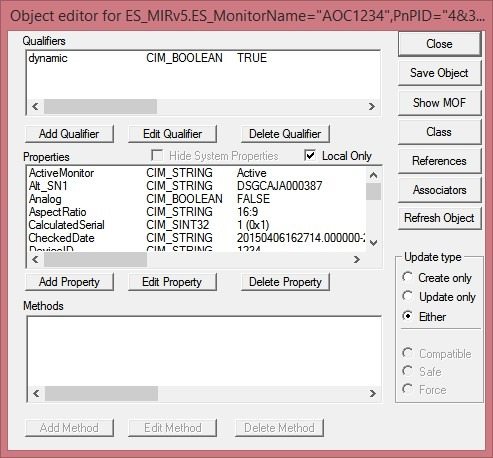
Instead of the BIOS alias, we might just as well have used Path Win32_BIOS, it wouldn't have made any difference. Take a good look at WQL if you intend to use WMIC seriously. However, these parenthesis tend to break your FOR /F loops.Ī limitation of the WHERE clause is that it cannot select properties of type array. Parentheses are required for more complex WHERE clauses: WMIC Path Win32_NetworkAdapter Where ( Manufacturer = "Realtek" And PhysicalAdapter = TRUE ) Get The following commands will work: WMIC Path Win32_NetworkAdapter Where "Manufacturer='Realtek'" Get WMIC Path Win32_NetworkAdapter Where (Manufacturer='Realtek') Get WMIC Path Win32_NetworkAdapter Where (Manufacturer="Realtek") Get WMIC Path Win32_NetworkAdapter Where "Manufacturer = 'Realtek'" Get Realtek in this case is a string, so we need to place it in quotes, preferably without confusing them with the quotes for the entire WHERE clause. The following command will not work: WMIC Path Win32_NetworkAdapter Where "Manufacturer=Realtek" Get Now list only adapters manufactured by Realtek.
Wmic get file time Bluetooth#
The following modified query returns only 2 instances on my computer (it turns out the BlueTooth dongle is also considered a physical network adapter): WMIC Path Win32_NetworkAdapter Where "PhysicalAdapter=TRUE" Get WQL or WMI Query Language allows us to get only those instances matching the conditions set by a WHERE clause. If all you want to know is the number of adapters, just list the indexes only: Often WMI queries return far too much information, so we want to narrow down the selection.įor example, the following query against my own computer returns 27 instances, even though it has only one network adapter: WMIC Path Win32_NetworkAdapter Get Note: Narrowing down the returned selection with WHERE

Now prepend each of those lines with SET BIOS. Try to figure out for yourself how that worked.Ī hint: try the plain WMIC command, without the FIND filtering and without the FOR loops, and see what the output looks like. Need to store the properties in variables? Try this (note the commas now being " escaped" by ˆ, carets): FOR /F "tokens=*" %%A IN ('WMIC BIOS Get Manufacturerˆ,Nameˆ,Version /Value ˆ| FIND "="') DO ( Need the result pasted in another window? You may want to save the latter to a HTML file to view it in a browser: WMIC /Output:bios.html BIOS Get Manufacturer,Name,Version /Format:htable WMIC BIOS Get Manufacturer,Name,Version /Format:htable WMIC BIOS Get Manufacturer,Name,Version /Format:list WMIC BIOS Get Manufacturer,Name,Version /Format:csv Now let's try the following commands: WMIC BIOS To find out which methods are available for a specific WMI class use a command like:ĭo not use WMIC's CALL command unless you are absolutely sure about the consequences.
Wmic get file time free#
To find out which properties are available for a specific WMI class, use a command like:įeel free to experiment with WMIC's GET command, it won't change any setting.
Wmic get file time professional#
Like WMI itself, WMIC is available as of Windows XP Professional.Īnd though WMI can be added on Window NT, WMIC requires Windows XP Professional or later. With WMIC we can use WMI queries in batch files.

I expected WMIC Path Win32_LocalTime Get Hour to work with this one. What am I doing wrong here, could anyone help out? So if the clock is 2:33 it goes to :hour2 but when it's 4:33 it gives an error " (goto was unexpected at this time." For /f %%# In ('WMIC Path Win32_LocalTime Get Hour^|Findstr ') Do (Set DOW=%%#) It works, but not on every hour which is strange and I can't figure it out. I'm trying to have a batch file to perform different task based on hours (24h clock).


 0 kommentar(er)
0 kommentar(er)
